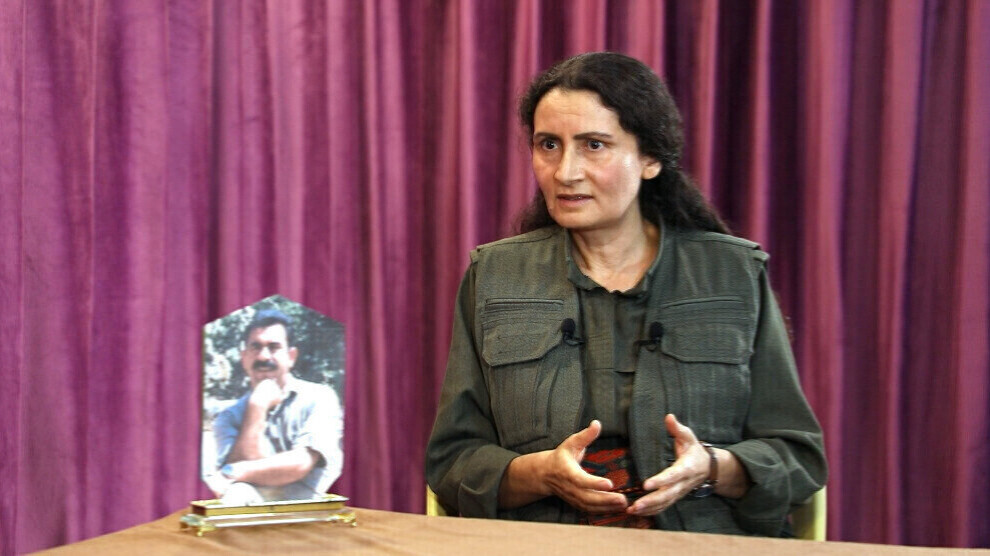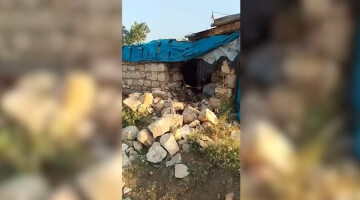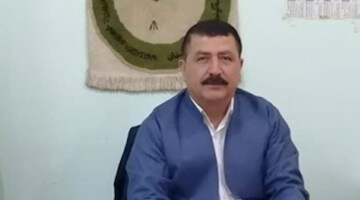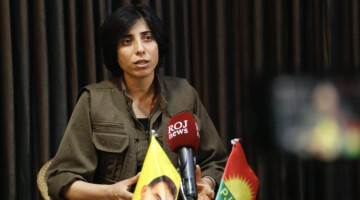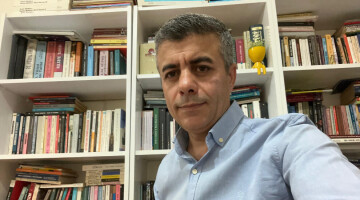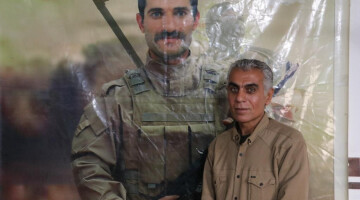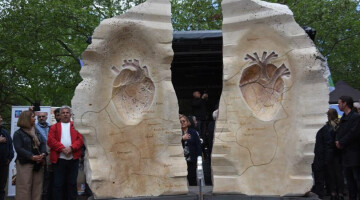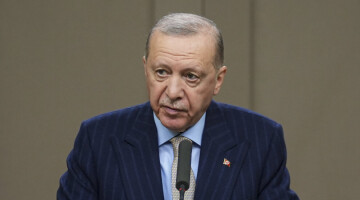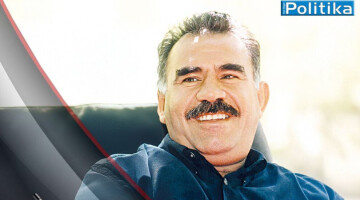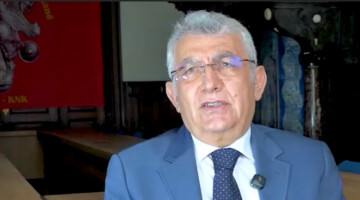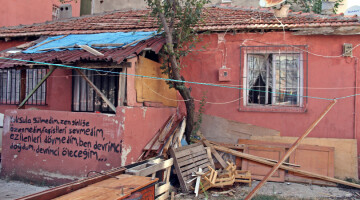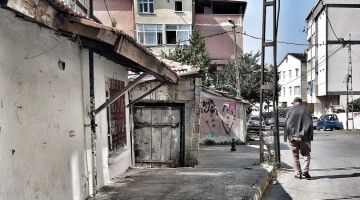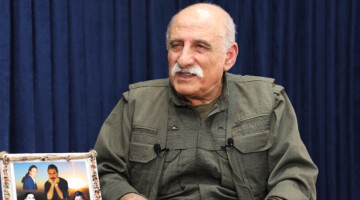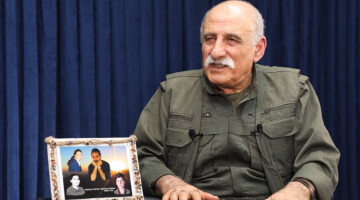In an interview with Medya Haber TV, Besê Hozat, co-chair of the KCK (Kurdistan Communities Union) Executive Council, spoke about the ongoing ‘Process of Peace and Democratic Society’. She comments in detail on the discussions surrounding the manifesto created by Kurdish people's leader Abdullah Öcalan, which is an expression of the process and an expression of the transformation of the Kurdish freedom movement. Among other things, Hozat also evaluates the ongoing geopolitical developments and the situation in Iran.
We publish the first part of the in-depth interview below:
In recent weeks, a number of materials have been published regarding the ongoing process and changes in the freedom movement. Central to this is the comprehensive manifesto by Kurdish people’s leader Abdullah Öcalan. It is being discussed intensively by a wide variety of circles. It has met with widespread approval, with many seeing it as an opportunity for a long-necessary debate, but of course, there is also criticism. Some of the criticism, for example, regarding analyses of Alevism, is quite harsh. What can you tell us about the manifesto and the discussions and criticism that have unfolded in its wake? Do you understand the criticism?
All materials related to the 12th PKK Congress have been published. One of them was the significant and enlightening ‘Manifesto of Peace and Democratic Society’ prepared by Leader Öcalan. In it, he comprehensively examines the various facets of human history, with a particular focus on the history of women and the Kurds. The manifesto is an assessment that places the historical realities in their proper context, almost rewriting history according to its true nature. Of course, there are intense debates surrounding this. Even though we cannot follow all of them, the essence of some debates has reached us. As valuable as these discussions are, we have also heard of approaches and criticisms that have no real basis but are only expressed with the intention of attacking Leader Öcalan. Such discourse is inappropriate and is an approach that should be criticized.
What is expressed by these individuals and groups who have no intention of engaging in honest debate but simply resort to provocation and sabotage in order to conceal their own reality can hardly be understood as criticism. It is defamation. What is needed is criticism based on serious grounds and, in general, a healthy debate.
The analysis and perspectives expressed by Leader Öcalan in the manifesto are assessments he has developed over the past decades. It is an accumulation of knowledge and deepening of understanding that has grown over time, building on the period of the struggle in the form of the group, from the founding of the PKK to the present day. Leader Öcalan has developed a deep understanding of history, and based on his analysis of these realities, he has developed his ideas over the decades. The manifesto did not simply appear out of nowhere.
Particularly through the Manifesto of the Democratic Civilization, Leader Öcalan published profound, striking, and new assessments regarding Alevism, Kurdish history, Marxism, and women’s history. Now, through the new manifesto, he has further deepened these assessments. Particularly noteworthy is what he brings together: the history of the region and the history of women with universal history, as well as analyses concerning the understanding of quantum and dialectical perspectives that are not based on dogmatic idealistic or materialistic ideas, to mention just a few aspects. In doing so, he criticizes many shortcomings, but without categorically ruling anything out. Instead, he values everything and sees what it has given to society and humanity.
And I emphasize this while speaking with my identity as a woman, a Kurd, a socialist, and an Alevi. When I read the manifesto with those identities in mind, I feel tremendous empowerment and energy. Through the reading and discussing it, my horizons are broadened, and I feel excitement and enthusiasm. It creates tremendous joy in me. I do not see any misjudgment regarding all these identities. On the contrary, it opens my own consciousness and strengthens my quest for freedom. I am convinced that this is how all other female comrades, all comrades in general, our people, and democratic and socialist forces feel when reading and discussing the manifesto. Without question, there are also criticisms and evaluations from these circles, which is legitimate and important. This is a search for understanding, a search for comprehension.
When Leader Öcalan expresses his opinions and conclusions on issues that are very entrenched, it is only natural that this causes quite a stir. When dogmas are challenged, resistance is inevitable. When a new thought or idea is pitted against something that has been elevated to a dogmatic level, like a god or a religion, it surely triggers anger and frustration. This turns things upside down, and the consequences are logical and understandable.
We ourselves know how difficult change and transformation can be, as we have been confronted with it for years. This makes it easier for us to understand where the reactions come from. Some of the criticism is probably fueled by the unease that people are beginning to realize that what they have stood for for years needs to be overcome. As I said, we can understand this and still consider them valuable without a doubt. They contribute to the necessary progress. Only in this way can an even more accurate understanding and a more targeted struggle be achieved. So, we attach value to everything; the only thing I criticize are those who express their ‘criticism’ with the intention of denigration and provocation. These ‘criticisms’ come from the circles of collaborators and traitors who are only trying to obscure their own reality. These are not criticisms but attacks, and we reject them with all our might. These people should first deal with themselves and face their own reality.
Leader Öcalan’s assessment of Alevism, particularly Kurdish Alevism, is accurate. The Kurdish Alevi faith is essentially the so-called ‘Faith of the Rightful Way’, and is based on Zoroastrianism and the remnants of Neolithic society. It is based on Neolithic society, animist beliefs, and nature worship. In fact, Kurdish Alevism is, in a sense, a belief in nature. It is an ecological belief. The influences of animism are very strong. I myself have experienced this deeply. That is, the environment I lived in, the family I grew up in, was a family where Alevi culture and belief were very strong. I am talking about the nuclear family and the environment. What I want to highlight: Leader Öcalan says that a fabricated Alevism was created by the ‘Committee of Union and Progress’. Especially over the course of the past 100, 150 years, Kurdish Alevism has been tried to be assimilated through it. Kurdish Alevis have been tried to be Turkified. That is a reality that cannot be denied.
That is something I remember from my own childhood. My father was born in 1920/21, and my mother was born in the 1930s. When the Dersim (tr. Tunceli) Massacre took place, my father was married and had three children. His three children, his wife, and his father – that is, my grandfather – were killed in the Dersim Massacre. Before the massacre, the Alevi faith and Kurdish culture were much stronger and had not been assimilated to such a great extent. I still grew up with Kurdish culture, and I still grew up with that Alevi culture and faith. Ask the elderly in Dersim, and they will all say, “I am Kirmanc.” “My language is Kirmanc,” “Kirmanckî.” Alevism, Alevi identity, only became so dominant much later, after the Dersim genocide. It has now been elevated to a position that almost overshadows national identity. Now, if you ask anyone, they will emphasize their Alevi identity first. Why? Leader Öcalan has done a lot of deep research, reading, and discussing this, and we know it all from our own lives. We know it from putting it all together and reading about it historically. I personally have also done a lot of reading on Alevism. When I look at it, I can definitely say that the assessments made on Alevism, especially by the ‘Committee of Union and Progress’, over the past 100, 150 years, have almost homogenized Kurdish, Turkish Alevism, and Arab Alevism. However, there are very serious differences and unique characteristics. Such writings and evaluations developed on Alevism, many writings, discourses, and debates in this sense were developed as part of the cultural genocide and religious genocide carried out on the basis of Turkification of Kurdish Alevis and Turkification through Alevism. No one can deny this. This is a fact. Therefore, it is very important to approach the evaluations and observations made by Leader Öcalan correctly, to try to understand them, to research their depth, and to examine them.
Leader Öcalan has also made similar assessments in the past regarding Seyit Rıza. That is, he valued his resistant attitude, his unyielding stance. “I was not able to see through your lies, and that troubles me; but I didn’t kneel before you, and that should trouble you” — Leader Öcalan always attached great value to these last words of Seyit Rıza. He said he drew tremendous lessons from this. He stated that he developed this struggle to such an extent through the lessons he drew from this, through the inspiration he gained, that he neither deceived nor was deceived; that is, he developed this struggle along this line.
What I said with regard to Alevism also accounts for the Kurdish identity. If there had been no 52-year struggle for freedom, we would not be able to talk about Kurdish identity today. All Kurds would have been assimilated, subjected to genocide, and nothing would remain in the name of the Kurds. This is clear. The last 200 years of history, in particular, are full of massacres. It is a history filled with cultural genocide, ecocide, and all forms of genocide. The will of the Kurds had been broken before the PKK emerged, and the Kurds had been subjected to genocide. They had reached a point where they were afraid to be Kurdish and to express their Kurdish identity. They weren’t able to speak Kurdish anymore. I remember we had a precious recorder at home that played Kirmanckî songs. At that time the language was banned; Kurdish was banned. There had been military operations in our village on a daily basis. They were constantly searching, insulting the people, and beating and cursing them. Those who spoke Kurdish were tortured. My mother would wake up at dawn every morning to go out to check; she would look around, and if there were soldiers nearby, she would immediately wake us up from our sleep. We would take that recorder and hide it in the hay. After the operation was over and the soldiers had withdrawn, we would take the recorder out of the hay and bring it back. We would play it when there were no soldiers around. We listened to the records and spoke our language to prevent it from being killed. Out of fear, we couldn’t speak Kurdish in front of the soldiers. Those who didn’t know Turkish would go mute, become speechless.
We lived through this; we saw it. I lived through it myself. Who can dare try to deny this? That is what Leader Öcalan is talking about. He is speaking about the Kurd who is afraid to express herself/himself, that is cowed, whose will is broken, that is used by everyone, that is forced into everyone’s service, and that is turned into soldiers, workers, and slaves. His critics are not towards the free Kurd; it is not about the organized, determined Kurd; it is not about the Kurd who is conscious of her/his own existence and identity and who struggles for it. The Kurdish identity has been under constant attack and oppression for hundreds of years, facing serious fragmentation and disintegration, and particularly, over the past 200 years, there has been a history of horrific genocide, physical massacres, and cultural genocide. What can a Kurdish people subjected to such cultural and physical genocide have? We have lived through it! Their own language was banned, living in constant fear. It is important to understand this correctly and give it the right meaning.
Throughout history, almost a form of a tradition of betrayal and collaboration has developed in Kurdish society. When a society faces existential threats for thousands of years, it is clear that at some point that society will become fragmented and begin to decay. This is widespread in Kurdish society today. It is precisely these circles that became traitors to their own society and collaborators that Leader Öcalan refers to when he speaks of the ‘Judenrat’ under German fascism. Why are these circles reacting so harshly to this? Because the analysis is accurate. They are traitors to their own society and collaborators. That is why they attack in the form of smear campaigns. They are the ones Leader Öcalan refers to when he speaks of ‘Judenrat’. The history of the Kurds is full of them. It is a list that goes on and on, for naming them the time of the interview wouldn’t be sufficient. A very obvious example: the structure that they call the ‘village guards’. They are collaborating with the state everywhere, engaging in Kurdish hostility, attacking free Kurds, and creating a comfortable living space for themselves. They are collaborating with the colonialist enemy, with those who perpetrate genocide, acting as counter-revolutionaries and assassins. There are not a few Kurds like this. They are Kurdish by ethnic identity but are enemies of the Kurds. They are traitors. They attack the identity of the free Kurds with the greatest hostility. These traitorous collaborators, whom we call ‘Judendrat’, are present in politics, commerce, the media – everywhere. They are present in every part of society. I don’t want to name names. There are many, and most of them are known by society. They appear on television as “terrorism experts” or “security experts,” as journalists, media members, or writers. They spend 24/7 on television spreading Kurdish hostility and legitimizing the genocidal war policies.
There may be those who have misunderstood the point, feel offended by this misunderstanding, and therefore react against it. My criticism does not, of course, refer to them. They say, “Judendrat was a Jewish council during the Jewish genocide. It was a council made up of collaborating Jews. They collaborated with the Nazis. What does this have to do with the Kurds?” They may have a weak sense of history or may not understand, so they criticize. These are understandable. My criticisms are not directed at them. My words are directed at those who know the truth, are aware of what Leader Öcalan is referring to, and attack his evaluations.
The topic of Judendrat and the line of collaboration and treason must be discussed at length among Kurds. All their true faces must be revealed, and they must be condemned. If there were no Judendrats in Kurdistan, among the Kurds, the Kurdish question would definitely have been resolved on a democratic basis by now. Turkey would have become democratic, and the Middle East would have become democratic. The fact that the Kurdish issue is still being fought over despite such a heavy price, that the existence and freedom of the Kurds have not been guaranteed, that their identity has not been guaranteed, that they do not have a democratic and free status, and that they do not live freely in their country is fundamentally, and even primarily, due to these Judendrats among the Kurds. This is the line of collaboration and treason. This is a fact that cannot be denied. It is necessary to approach and discuss this issue from the right angle. And it is important for the free press, everyone who is struggling, and everyone who is fighting for freedom and democracy to give effective and powerful responses to such individuals and circles.
Similarly, Leader Öcalan has striking assessments of Marxism and also assesses the collapse of real socialism to a large extent. He says that addressing all issues on a class basis led to the collapse of real socialism. Did human history begin with class? The first contradiction in history is the contradiction between women and men. The first socialization was the socialization that developed around women. It is communal; it is clan-based. And then, with the organization of men against women and their seizure of the values formed around women, in women’s sociality, and their establishment of dominance over women, over the sociality created by women, the first and deepest contradiction in history began. With it, of course, by time, classes gradually emerged.
When Leader Öcalan says this, he does not deny or reject class contradiction. On the contrary, he approaches and evaluates the truth of history in all its dimensions. Class struggle has existed for a very long time in society, but its basis has been the struggle and contradiction between the commune and the state, that is, between the sociality created by women and the power-state system created by the male-dominated mentality. Leader Öcalan bases the historical struggle on this, and this is absolutely appropriate. He also highlights that in his later years, Marx also had similar searches and evaluations. Marx wrote and discussed the Paris Commune. He thereby reached new understandings, but neither his life nor his knowledge was sufficient, nor did the reality of that era allow it, that he would further develop it. Leader Öcalan also says that Marx, Lenin, and Engels have undoubtedly contributed great values to humanity, that a very powerful social struggle has been waged by the peoples, women, and humanity on the basis of those ideas and thoughts, and that very important values have emerged. He acknowledges this without hesitation. This is not what he criticizes. It is important to make a comprehensive assessment by re-reading all these sections, especially in the five volumes of the Manifesto of the Democratic Civilization, and by re-reading the new manifesto after it. This can lead to healthier and more accurate assessments.
Again, in recent weeks, some minutes of meetings on Imrali have come to the fore. It is said that there is a discussion about Jewish identity. Leader Öcalan has already made broad and important evaluations in this regard in the five volumes of the Manifesto of the Democratic Civilization; his current evaluations are not independent of those. I recommend that those who have problems understanding the current excerpts of discussions and those who believe they have gained a complete picture based on abbreviated and therefore inaccurate summaries and make assessments based on this truly read the prison writings and, based on this, formulate their evaluations. One has to look at the whole picture in order to be able to analyze it. Throughout history, Jews have had a great deal of interest in Kurds. They have placed great importance on their relationship with Kurds. In fact, Jews say that they have a lost tribe, and they specify that this tribe is the Jewish-Kurdish tribe. These things are mentioned in history. There are still Kurdish Jews. Especially in Mosul and other places in Southern Kurdistan (Northern Iraq), and again in other places like Colemêrg (tr. Hakkari). There are Jewish communities among many peoples. This has been the case throughout history from the Kurds’ perspective as well. The Jews’ support for the federation process in Southern Kurdistan and the struggle in Southern Kurdistan against Saddam’s dictatorship has been significant. This is not an evaluation we make, but a historical reality.
The Kurds are a strategic power in the region. Whoever establishes relations with the Kurds, whoever develops relations with the Kurds, and whoever develops an alliance with the Kurds gains superiority in the region. Strategic relations and alliances with the Kurds play an almost decisive role in becoming the fundamental, strategic power of the region. Everyone is discussing this now. So is, for example, Turkey as well. One reason for this process is those discussions. It is a dimension of the ‘Process of Peace and Democratic Society’. And not only Turkey, but also Israel, the Arabs, and the Persians are discussing it.
The Kurds’ relationship with the Persians is very ancient and historical. Again, the relationship with the Turks is a thousand years old. The relationship with the Jews is a relationship that goes back thousands of years. The fact that Leader Öcalan takes these historical realities into account and evaluates them in the context of current politics is therefore the most logical and reasonable thing to do. We need to approach history correctly, rationally. We need to approach it dialectically. We need to approach it with historical sociology. I invite everyone to approach it the same way.

